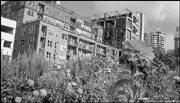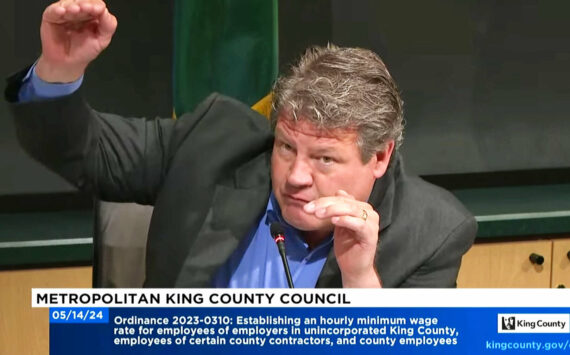When gardeners at the Belltown P-Patch want to get close to nature by putting their hands in the soil, they make sure to don rubber gloves. It’s a safety precaution against AIDS and hepatitis, because as often as not, they’ll find spent syringes and human excrement amid the greenery. They’re also likely to find piles of beer cans, cigarette butts, food containers, bedding, used toilet paper, and damaged plants—all remnants of street people who use the P-Patch as a place to sleep, party, and relieve themselves.
It’s a fact of life that makes gardeners like Liz Kane irate. “This is such a unique spot in the city, and people come and wreck it on a daily basis,” says Kane, sitting on steps leading to the P-Patch. The steps are embedded with vividly colored tiles—just one piece of the artistic work in the garden that opened to great fanfare in 1995. After open-space crusaders persuaded the city to buy land at the corner of Elliott Avenue and Vine Street, local artists rallied with contributions, including a whimsical solar-powered fountain, an intricately designed iron gate and railing, and large tile mosaics that adorn a retaining wall.
The garden is still a beautiful place to visit, with towering sunflowers, lush dahlias, and plentiful roses. But gardeners feel that it has become so difficult to maintain that they are planning to put up a locked fence, pending approval by the city’s P-Patch program. Although common in New York and other big cities, it would be the first time that a Seattle P-Patch would be locked, striking at a core value of such gardens. “These are public spaces,” says the city’s P-Patch program manager, Rich Macdonald. “Part of being a public resource is that it is open for the public to use.”
He says nevertheless that the problems at the Belltown P-Patch are so bad that he supports the use of locks, though he hopes that gardeners will figure out regular times to open it to the public, perhaps during lunch time or on weekends when community events could be held there.
The conflict over the P-Patch has a familiar ring that calls to mind the contradictions of Belltown life. On one side is the Millionair Club, the charity that finds day labor for a largely homeless clientele. On another side is a new high-rise called the Vine, draped in a banner that advertises itself as “luxury Belltown condominiums.”
But this is not exactly a battle between Belltown’s new haves and the have-nots who have historically made the neighborhood their home. The driving forces behind the P-Patch are people like Rob Folendorf, a self-employed weaver who lived in a commune in the 1970s and sees the garden as part of his commitment to organic farming. And their nemeses tend to be a certain segment of the street population engaged in particularly destructive—and sometimes dangerous—behavior that even homeless advocates agree should not be tolerated in a space devoted to gardening.
“You just missed those people,” Folendorf says one day last week, about two minutes into an interview at the garden. He nods his head in the direction of a man and woman making their way through the opposite end of the garden. The woman, with frizzy hair and wearing a black sweater, is a regular at the site, according to Folendorf. He recently saw her performing oral sex while someone else was injecting her with a needle behind her knee.
Like others, Folendorf has been assaulted at the site. A few years ago, he came over to water his plot in the middle of a weekday when he saw a woman doing a striptease for three guys. “I told them to stop and leave. The woman was in her bra and panties, and she grabbed a switchblade out of a backpack and started running toward me with it.” He escaped the blade but was hit in the back by a rock the woman picked up and threw.
Such activity makes Kane and other women sometimes scared to go to their plots. But they also show a tenacious resolve. “I think I was here to put something pretty in the ground, originally,” says Kane, a local condo resident who works for a construction company. “Now I’m here to prove a point—I’m not going to let people stamp out all the beauty that’s around here.”
And so a kind of war has broken out between some of the gardeners and the street people who use the P-Patch. When gardeners like Kane and Folendorf find people passed out amid the plants, they frequently turn a watering hose on them—cell phones in hand to call the police if necessary.
The street people, in turn, have their own methods of retaliation. One man who was hosed followed Folendorf to his nearby warehouse apartment and now defecates several times a week at the gardener’s doorstep. A street woman regularly slimes Folendorf’s doorknob with spit.
One woman gardener who doesn’t want to be identified believes that a man who regularly spends the night in her plot deliberately pulled up her tomato plants last week because he thought she was trying to chase him off by piling harvested beans where he sleeps. She then took a blanket he leaves there for sleeping, covered it in hot sauce, and placed it back in the plot with a note written on a cardboard box: “I let you sleep here all summer, and then you pull out my tomato plants?!!? Find someplace else to sleep because you will not rest here in peace.” She says she’s going to bring a police officer to the plot at 5 in the morning to pay a surprise visit to the guy and “soak his ass.”
For sensitive, community-building organic gardeners, it’s come to that.
With police saying there’s only so much they can do in a neighborhood like Belltown, the P-Patch’s board is, after much debate, drawing its line in the dirt by preparing to put up the locked fence. Not all of the P-Patch’s 34 gardeners approve. Notably, Myke Woodwell, who helped found the P-Patch and now serves as president of its board, says he thinks the fence is “a bad idea.” Some in the community already regard the P-Patch as a publicly funded exclusive club (though anybody in the community can get on its waiting list), and a fence won’t help that reputation, he believes. He also thinks that if community members could be persuaded to use the garden as more of a gathering place, street people would be discouraged from unacceptable behavior.
He and others note that the site is on the verge of transformation: The Growing Vine Street project will create a series of planted areas along the sidewalk by the P-Patch, with areas for sitting. Renovations are being planned for three historic cottages that sit vacant on a lot next to the garden. With those attractions likely to bring more eyes on the street, some feel the problem might dissipate.
Gardeners like Folendorf are too fed up to wait. Still, a visit to the garden early one morning serves as a reminder that it isn’t only druggies and prostitutes that will be shut out when locks go up. Two photographers are there scouting the place for future shoots. So, too, is a homeless man named Demar, a 39-year-old in a blue sweatshirt and glasses whose self-possession belies his situation, and who sits by the fountain rolling cigarettes. Homeless for only a few weeks, Demar says he sleeps next to a nearby building, not here; he’s just come for a smoke, something he says he does from time to time.
“It’s nice to be here in the plants,” he says. “There’s not a lot of places you can do that downtown.”
nshapiro@seattleweekly.com 








